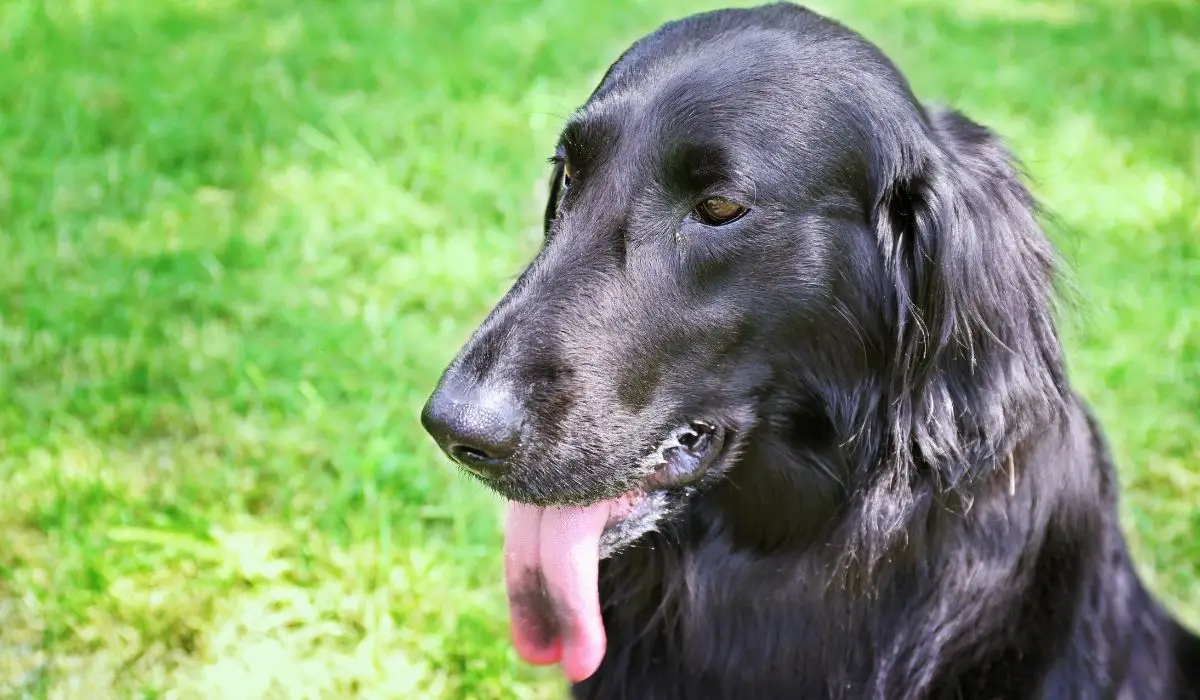Last Updated on November 11, 2023 by Linda Richard
Being a dog owner means watching out for certain things in addition to playing and having fun with your pooch. For example, why do dogs have black spots on their tongues, and is it dangerous? This is likely a question you never thought you’d ask before getting a dog, but it has suddenly become quite urgent. Fortunately, the answer is much more harmless than you might fear.
Table of Contents
Why Do Dogs Have Black Spots On Their Tongues?
In short – because of standard skin pigmentation. Just like dogs can sometimes have darker spots on their bodies under all their fur, they can also have darker spots on their tongue, mouth, and lips. In fact, you can see such “dar points” almost everywhere on a dog’s body – the eye rims, the paw pads, the nose, tail, and all across the body and legs. The tongue is no different.
It can feel a bit distressing to see such points on a dog’s tongue, of course. First, because it doesn’t “feel normal” (like on the lips or eye rims, for example), and second – because we usually don’t see most other black spots under the dog’s fur.
Do Dogs With Black Spots On The Tongue Need To Go To The Vet?
No, they don’t, at least not most of the time. The black spots people typically talk about are completely normal and harmless. Taking your dog to the vet for that would be the same as taking your pet to the vet because there’s a darker pigmentation on one of its paw pads – it’s pointless and unnecessary.
The Chow Chow Connection?
A common myth people often use to answer the question of “Why do dogs have black spots on their tongues?” is that they have Chow Chow blood in their mix. Is there any validity to this?
Not really. Chow Chows are one of those breeds that typically have an all-black/blue tongue which is likely the origin of this myth. Another popular example of such a breed is the Chinese Shar-Pei. However, this really has nothing to do with the black spots on some dogs’ tongues. Any breed can have those, regardless of whether they have Chow Chow ancestors or not.

Which Are The Breeds That Most Commonly Have Black Tongue Spots?
All breeds can have such black spots, although some do exhibit them more often than not. Those are the same breeds that tend to have black lips/gums, black eye rims, black noses, and black pigmentation on their paw pads:
- Labrador Retriever
- Golden Retriever
- Newfoundland
- German Shepherd
- Mastiff
- Doberman Pinscher
- Australian shepherd
- Irish Setter
- Akita
- Chow Chow
- Chinese Shar-Pei
- Rottweiler
- Pomeranian
- Pumi
- Puli
- Dalmatian
- Airdale Terrier
- Curly-coated Retriever
- Portuguese Water Dog
- Komondor
- Black Russian Terrier
- Staffordshire Bull Terrier
- American Staffordshire Terrier
- Most other pit bulldogs and other breeds
In general, however, any other dog breed can have such black spots too just as they can have skin pigmentation elsewhere on their bodies. Certain purebred dogs are bred according to standards that make such pigmentation almost impossible but even then, you can see dots in some dogs. And if your dog isn’t entirely purebred, your black spots are even more likely.
So, almost regardless of your dog’s breed, you shouldn’t be too surprised if you notice some dogs on your pet’s tongue, gums, or lips. They aren’t a problem, and they only make your dog more unique. They’d only be a cause of concern if you want to adhere to a certain breed standard for competition, and black pigmentation isn’t expected for your dog’s breed.
So, A Black Spot On A Dog’s Tongue Is Always Safe?
Of course, when we talk about black spots on a dog’s tongue, we mean the most common and standard case where they are just skin pigmentation. This isn’t to say that your dog can’t have health issues on its tongue that are identified with some noticeable darker markings. There are quite a few mouth disorders dogs can have, including some cancers such as tongue cancer. Noticing signs of anything like that will merit an immediate vet visit.
What To Watch Out For?
If there are some tiny black spots on your pup’s tongue, that’s not an issue. The standard pigmentation spots will either be there right from the start of your pup’s life, or they’ll develop before adulthood. However, if you notice any of the following, those should raise your concern:
- If the color of the spots is anything other than black or blueish black
- There’s a foul odor coming out of the dog’s mouth (fouler than usual), and you haven’t fed your dog anything new or strange
- The spots are starting to protrude a bit and aren’t just differently-colored parts of the tongue’s skin
- You’re noticing changes – especially rapid ones – in the spots look and size after the dog has reached adulthood
Any of these symptoms should merit a vet visit. But, if neither of those four is the case, we’re likely talking just about standard skin pigmentation. You can still mention it to your vet the next time you visit, of course, but you don’t need to go there specifically because of that.
In Conclusion, Why Do Dogs Have Black Spots On Their Tongues?
Black spots on your dog’s skin and tongue are perfectly normal for dozens of breeds. Even for those dogs that have such darker skin spots less often, it’s still nothing to worry about. Darker pigmentation spots aren’t related to any diseases or health problems, they are just a genetic skin quirk that makes your dog even more fascinating.
Of course, when talking about dark spots, we must differentiate between simple skin pigmentation and a dire health problem such as tongue cancer.
If the dark “spots” on your dog’s tongue are actively protruding out of it, if they smell weird, if they are rapidly growing despite your dog being an adult, or if they have an unnatural color – call your vet immediately. Other than that, there really isn’t anything to worry about.


1 thought on “Why Do Dogs Have Black Spots On Their Tongues And Is It Dangerous?”
Comments are closed.